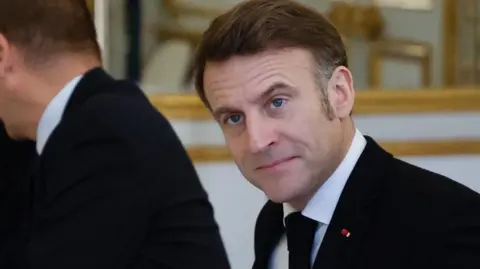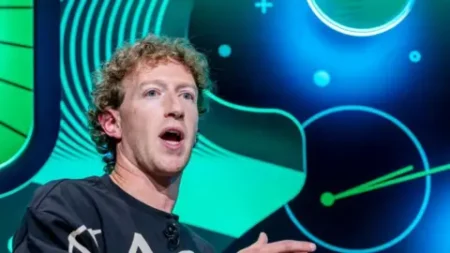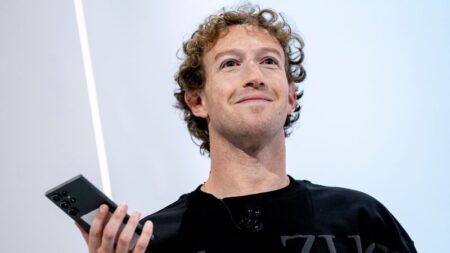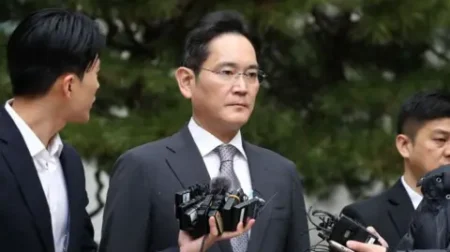French President Emmanuel Macron has recently made headlines regarding the clever use of artificial intelligence-generated deepfake videos. This action aims to draw attention to the commencement of the highly anticipated AI Action Summit taking place in Paris. The summit focuses on the various implications of artificial intelligence in contemporary society, including its impacts on governance and the environment. By utilizing deepfake technology, Macron is leveraging digital innovation initially designed for entertainment purposes to make a larger statement about the future of AI.
In a video posted across his social media platforms, including Instagram, Twitter (formerly X), and TikTok, Macron cheekily engages with a compilation of AI-fabricated videos where his likeness is featured in various popular films and television series. His response to this collage was candid, exclaiming “nicely done.” The deepfakes, which have circulated on French social media for some time, exemplify his embrace of the meme culture that has developed in response to his presence on these platforms.
In contrast to this playful approach, Macron has previously addressed the darker sides of deepfake technology. In an interview with Variety, he expressed that while they can be amusing, they may also constitute harassment, particularly when utilized maliciously. Experts have injected a note of caution into the conversation surrounding deepfakes, warning that normalizing their use could complicate the ability to distinguish between genuine and fabricated content. This is a significant concern as misinformation, especially involving public figures, can have substantial consequences for democracy and public trust.
The videos featuring Macron, which include appearances in a disco-themed clip and a hair styling tutorial, demonstrate the technology’s potential for creating engaging content. Macron even humorously acknowledged this growing phenomenon, stating, “It made me laugh,” while also asserting the profound capabilities that AI can unlock in fields such as healthcare and energy. He emphasized that France and Europe should position themselves at the forefront of this technological revolution, harnessing the potential of AI to enhance societal development while maintaining the core values ingrained in democratic principles.
As the two-day global AI summit kicked off in Paris, the overarching theme revolved around uniting world leaders, technology executives, and academics to explore AI’s societal impact. While the use of deepfake technology by Macron might appear to be lighthearted promotion for the summit, it raises important questions about the ethics of utilizing such innovations. Experts like Paul McKay from Forrester have cautioned against normalizing deepfake technology, underscoring the associated risks regarding authenticity and the potential for misuse.
Furthermore, scholars like Dr. Richard Little emphasize that while raising awareness of the issues surrounding deepfakes is essential, doing so by showcasing their ease of creation might inadvertently encourage wider adoption for less-than-desirable uses. Meanwhile, Prof. Philip Howard highlights the often ambiguous guidelines that shape public communication strategies, indicating a challenging landscape where the line between entertainment and misinformation is increasingly blurred.
In light of these developments, a debate has emerged in French media regarding whether Macron’s approach trivializes the serious ramifications of deepfake technology. Previously, Macron reiterated concerns about deepfakes possibly subverting democratic processes, advocating for regulation that would impose accountability upon those disseminating such content.
Amidst these dialogues, the European Union’s newly implemented AI Act is facing scrutiny, as some believe it stifles innovation rather than fostering it. The summit has also seen discussions about the EU’s proposal for a Europe-wide open-source AI model, allocated a budget of €37.4 million. Ultimately, a global declaration outlining shared AI goals and ethical responsibilities is anticipated to be unveiled as the summit concludes, though the commitment of the US and UK to endorse it remains uncertain.
In conclusion, Macron’s playful yet controversial engagement with AI-generated deepfakes serves as a focal point for broader discussions about the future of technology, its integration into society, and the ethical considerations that must accompany such advancements in an age where discernment becomes increasingly challenging.











